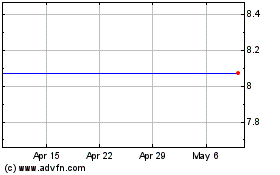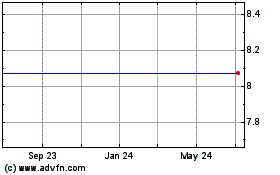SEC Investigating SunEdison's Liquidity Disclosures to Investors
March 28 2016 - 8:50PM
Dow Jones News
The Securities and Exchange Commission is investigating
SunEdison Inc.'s disclosures to investors about how much cash the
solar-power company had on hand as its stock price collapsed last
year, according to people familiar with the matter.
Officials in the SEC's enforcement unit are looking into whether
SunEdison overstated its liquidity last fall when it told investors
it had more than $1 billion in cash, the people said.
At the time, SunEdison shares had fallen about 75% since
midsummer. The slide has continued, with shares down 96% from a
July high, and the company is working with advisers on a potential
bankruptcy filing, according to people familiar with the matter.
The company's market value has fallen to around $400 million from
nearly $10 billion in July.
A SunEdison spokesman declined to comment.
SunEdison last month delayed filing its annual financial
statements, citing concerns raised by unnamed current and former
employees about the "accuracy of the company's anticipated
financial condition." In a regulatory filing, the company said its
board was looking into the matter and that the company could "be
required to reassess [its] liquidity position." Earlier this month,
the company said it had found "material weakness in its internal
controls over financial reporting" but that it had not yet
identified any material misstatements.
On a Nov. 10 earnings call, SunEdison reported $1.4 billion in
cash and said it had "sufficient liquidity" to weather a sharp
downturn in its stock price and cover upcoming obligations,
including a milestone payment related to its 2015 acquisition of
First Wind LLC.
People familiar with the matter said that $1.4 billion figure
consisted largely of cash that SunEdison couldn't access. The
company had direct access to only a few hundred million dollars
throughout September and October, and by November, the balance had
dropped under $100 million, the people said.
The bigger number reported to investors included cash that was
trapped inside individual power projects and earmarked for
construction or debt service, the people said. It also included a
roughly $500 million credit facility, whose funds could only be
accessed by delivering projects that met certain criteria, of which
SunEdison had few, some of the people said.
Such loans, known as "warehouses," are common in the
clean-energy industry. Companies place projects into the facilities
and take cash out, typically in the form of debt. But few of
SunEdison's projects fit the warehouse's criteria, which made it
highly unlikely that SunEdison would be able to tap the funds, some
of the people said.
By late 2015, SunEdison had stopped paying some contractors and
suppliers and was scrambling internally for ways to raise cash,
according to people familiar with the matter.
The Maryland Heights, Mo.-based company's share price has
plummeted since last summer on a confluence of factors. An
announced $1.9 billion takeover of residential-rooftop installer
Vivint Solar Inc. was unpopular among investors. Meanwhile, falling
oil prices caused a broad selloff for energy stocks, and turbulence
in the capital markets stoked concerns that SunEdison wouldn't be
able to finance its breakneck pace of acquisitions.
The Vivint deal was terminated earlier this month after banks
balked at providing the funding, The Wall Street Journal reported.
At least four other takeovers SunEdison struck last year were
subsequently canceled or renegotiated.
SunEdison's woes have tarnished a corporate structure once seen
as a breakthrough for energy financing, known as yieldcos. These
vehicles raise money from public investors to buy power projects
from developers, then sell power to utilities under long-term
contracts. SunEdison has two yieldcos, publicly traded TerraForm
Power Inc. and TerraForm Global Inc.
Renewable-energy companies, looking to free up cash for new
investments, began adopting the model about three years ago.
Investors piled in, attracted by yieldcos' high dividend payouts
during a time of ultralow interest rates, before a sharp decline in
oil prices battered energy stocks.
SunEdison stock closed up about 4% at $1.26 Monday after rising
as much as 15% earlier in the day on a debunked news report of a
takeover bid for the company.
Matt Jarzemsky contributed to this article.
Write to Liz Hoffman at liz.hoffman@wsj.com and Aruna Viswanatha
at Aruna.Viswanatha@wsj.com
(END) Dow Jones Newswires
March 28, 2016 20:35 ET (00:35 GMT)
Copyright (c) 2016 Dow Jones & Company, Inc.
MEMC Electronic (NYSE:WFR)
Historical Stock Chart
From Mar 2024 to Apr 2024

MEMC Electronic (NYSE:WFR)
Historical Stock Chart
From Apr 2023 to Apr 2024
